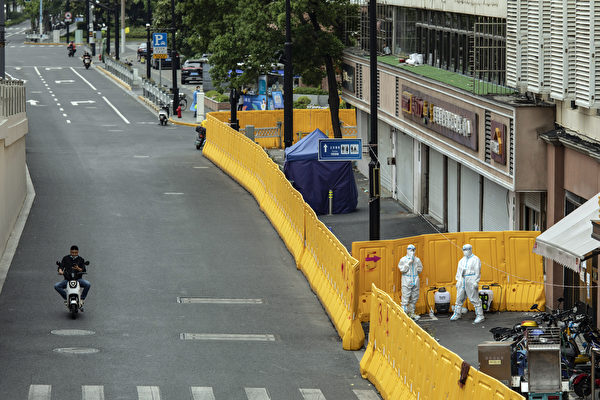
On May 16, 2022, Shanghai has been under lockdown for more than 6 weeks. The closure of the city has severely impacted the Chinese economy. (Getty Images/Bloomberg
Update 2022-05-25 4:04 AM
[Epoch Times, May 24, 2022] (The Epoch Times reporter Xia Song reported) The CCP's "zero-clearing policy" has hit the economy. UBS today (24th) released the latest report, pointing out that in the case of high uncertainty, China's full-year GDP growth forecast was lowered from 4.2% to 3%, and JPMorgan Chase cut it from 4.3% to 3.7% yesterday (23rd). The 5.5% annual growth target expected by the CCP authorities may come to nothing.
UBS forecasts China's full-year GDP growth of 3%, the second quarter is expected to shrink by 8%
UBS Investment Bank lowered its forecast for China's full-year GDP growth to 3% on May 24. If the Chinese authorities reduce restrictions on transportation and supply chains, there will be a V-shaped rebound in the third and fourth quarters, with a sharp rebound of 10% quarter-on-quarter , but only up 3.1% year-on-year.
Wang Tao, head of Asian economic research and chief China economist at UBS Investment Bank, pointed out that the epidemic and related restrictions have severely hit the mainland's economic activities in April. Slowed to 1.4%, an annualized contraction of 8% quarter-on-quarter.
Wang Tao said that although transportation and logistics began to improve since mid-April, progress has been slow. Consumption activities in several cities remain highly restricted, and property sales continue to fall, halving year-on-year in the first three weeks of May.
UBS advised investors to pay close attention to policy changes from the Chinese authorities on the outbreak, as well as massive stimulus measures and developments in the real estate sector.
In addition, JPMorgan Chase released a report on May 23, lowering China's full-year economic growth forecast from 4.3% to 3.7%. The bank also said that due to the epidemic lockdown, there may be a deeper contraction than expected in the second quarter. Earlier, Bloomberg Economics released a 2% forecast on May 19 and Goldman Sachs released a 4% forecast on May 18.
Institute of International Finance: $300 billion in capital will flow out during the year
Over the years, China's economic development has been driven by the "troika" of investment, consumption and export. After the "zero-clearing policy" hit the economy, it not only hit consumption, but also blocked the supply chain, seriously affecting exports. Not only that, but the attractiveness of the Chinese economy has plummeted as a result, and foreign direct investment is fleeing China.
The Financial Times reported on May 23 that a series of political and regulatory issues, including the CCP’s draconian “zero policy” and heightened geopolitical risks arising from its stance in the Russian-Ukrainian war, are undermining the performance of many multinational companies. Dreams, foreign direct and indirect investment began to flee China.
This unpredictability is prompting the European business community to "put on hold" investment in China, said Joerg Wuttke, president of the European Union Chamber of Commerce in China.
Michael Hart, president of the American Chamber of Commerce in China, warned that foreign executives preparing to travel to China are experiencing travel difficulties, including flight cancellations, visa complications and lengthy quarantines upon arrival, which will lead to the next two, three or four years. Investments declined substantially during the year.
In fact, the value of yuan-denominated financial assets held by foreigners fell by more than $150 billion in the first quarter of 2022, the largest drop ever. The share of stocks held by foreign investors in China’s stock market fell from about 4.3% at the end of 2021 to just under 4% in March. Total foreign equity holdings are down about 2 percent so far this year, according to calculations by research house Gavekal.
A total of $300 billion of capital will flow out of China this year, up from $129 billion in 2021, bankers group the Institute of International Finance (IIF) forecasts.
Li Keqiang announced 33 measures to stabilize economics
China's economy is suffering from internal and external troubles. Chinese Premier Li Keqiang has launched a series of measures to try to stop the rapid decline, but it remains to be seen whether it will work.
On May 23, Li Keqiang presided over an executive meeting of the State Council, frankly admitting that the downward pressure on the economy was expanding, and announced that he would implement 33 measures in six areas to stabilize the economy to push the economy back to normal. Some scholars have analyzed that this is "releasing water to raise fish", and some experts said that the zero-clearing policy must be revised before it can work.
"Jin Shan" (pseudonym), an independent Chinese economic commentator, told VOA that the new measures do not estimate the consumption needs of households and individuals. From the perspective of the authorities, supporting SMEs can bring direct tax revenue and visible economic growth. The authorities obviously did not expect that households with spending power would directly stimulate economic development.
Wu Jianzhong, secretary-general of the Taiwan Taoist Association for Strategic Advancement, analyzed Radio Free Asia, "These 33 measures are aimed at releasing water to raise fish! The question is how much water to raise? How many fish to raise? These fish are dying of starvation and thirst. Pointing water can’t change the external environment, and it can’t solve economic problems, and the current policy is basically an emergency approach.”
Huang Zhicong, a professor at National Chengchi University in Taiwan, told Radio Free Asia that it seems that there will be some positive effects on the economy, but the premise is that the reset policy must be revised, otherwise there is no way to change the basic control situation.
Responsible editor: Sun Yun#
https://www.epochtimes.com/gb/22/5/24/n13744327.htm
No comments:
Post a Comment